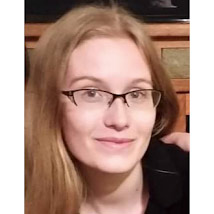
Host Mentor: Dr. Kyle Fink
UC Davis Stem Cell Program
Determining X Chromosome Inactivation Across Neuronal Differentiation in Patient-Derived Cells as a Putative Model to Study Epigenetic Editing Tools
Random X chromosome inactivation (XCI) causes mosaic gene expression of maternal and paternal alleles in females. This inactivation results in quasi-haploinsufficiency when there is a loss of function mutation in a gene in one of the X alleles. This quasi-haploinsufficiency can result in syndromes such as CDKL5 deficiency disorder (CDD), a severe epileptic encephalopathy. To counter this quasi-haploinsufficiency and others, the Fink Lab studies the targeted reactivation of X-linked genes using CRISPR/dCas9 epigenetic tools. In 2020, the lab partially reactivated silenced CDKL5 using deactivated Cas9 fused to Ten-eleven Translocation Methylcytosine dioxygenase1, a CpG demethylase (dCas9-TET1), in a neuronal cell line.
To evaluate targeted epigenetic editing in a disease-relevant model, the lab acquired CDD patient-derived iPSCs that had been clonally selected to have isogenic expression of either the mutant or healthy allele. However, targeted deep sequencing of CDKL5 in iPSC revealed that there was expression of the "silenced” allele ( approximately 8% of total reads) in both WT or Mutant expressing cell lines.
The first aim of my project was to analyze the state of XCI through targeted deep sequencing of CDKL5 from iPSC, neuronal stem cells (NSC), and neurons. We hypothesized that leaky expression of the silenced allele was either due to a mixed population of cells or incomplete inactivation due to the pluripotent state of the cells. To test for a mixed cell population, I selected single iPSCs colonies from both wildtype and mutant isogenic cells. To eliminate the possibility of DNA contamination during sequencing, a nested PCR was performed with an exon spanning primer set followed by a second mutation spanning PCR. Amplicon sequencing was performed by the Massachusetts General Hospital Center of Computational and Integrative Biology Core. To test whether incomplete XCI was caused by the pluripotent state of the iPSCs, neural stem cells (NSCs) derived from the same iPSCs was performed. Initial sequencing results of both iPSCs and NSCs showed high levels of variability in skewing of the mutant line between biological replicates. To further eliminate the possibility of genomic contamination, we performed a trizol chloroform extraction prior to further RNA purification to prepare NSC amplicons. Sequencing of mutant and wildtype skewed NSCs yielded 92.6% mutant and 92.87% wildtype reads, respectively. Based on this, it appears that differentiation does not have an effect on allele skewing. Future studies are focused on differentiating the NSC into neurons and re-analyzing the original iPSCs following our optimized protocol.
The Fink lab’s approach to reactivate genes from the inactive X chromosome takes advantage of known epigenetic modifications observed in natural escapee genes, namely low levels of promoter methylation. However, it is likely that multiple factors beyond promoter methylation contribute to a gene's ability to be silenced or active including levels of CpG methylation within a gene body, proximity to the XIST gene (which codes for a long non-coding RNA that initiates XCI), proximity to other inactivated genes, and histone methylation. To better understand features that could affect X reactivation, the second aim of my project is to analyze the epigenetic markers, genotype, and transcription of 38 genes associated with X-linked Intellectual Disabilities using ENCODE GM12878 lymphoblast data.